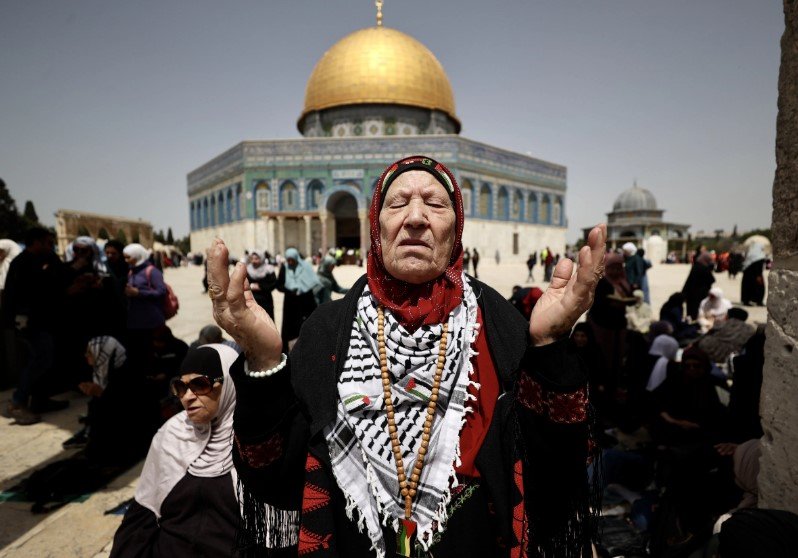Israeli youths and far-right politicians marked Israel’s occupation of East Jerusalem with a provocative march and a storming of the Al-Aqsa Mosque, chanting hostile slogans that sparked widespread condemnation across the region and beyond.
The annual march turned ugly quickly, as groups paraded through Muslim neighborhoods waving Israeli flags and shouting “Death to Arabs.” The situation escalated sharply when National Security Minister Itamar Ben-Gvir, known for his extremist views, led a controversial visit inside the sensitive Al-Aqsa Mosque compound, a site sacred to both Muslims and Jews.
A Flashpoint in a City on Edge
Itamar Ben-Gvir’s presence at Al-Aqsa Mosque — often a powder keg in the Israeli-Palestinian conflict — was seen as a deliberate provocation. In a video clip circulated online, Ben-Gvir was seen inside the mosque complex, clearly boasting about the event.
“There are actually a large number of Jews flocking here, and it’s a joy to see this,” Ben-Gvir declared, before adding, “Today, Jews can pray and prostrate here. We thank God for that.”
The minister’s words and actions sent shockwaves through the Palestinian community. His visit was not a quiet prayer session; it was a public display of nationalist pride in a contested space, inflaming tensions at a time when the region is already on edge.
Ben-Gvir wasn’t alone. Several other ministers and lawmakers joined him, including Yitzhak Wasserlauf and Knesset member Yitzhak Kroizer. Kroizer took the moment to voice fierce rhetoric about Israel’s internal security, saying, “We embrace friends, we crush enemies,” as he called for a tough stance against Israel’s foes.
One can’t help but feel the sharp sting of those words. In a place where peace talks are a distant dream, phrases like that ring loud and clear.

Palestinian Leaders Respond with Outrage
The Palestinian Foreign Ministry wasted no time condemning the event. They described Ben-Gvir’s intrusion as part of “the genocide, displacement, Judaization, and annexation” efforts Palestinians have been subjected to for decades.
The ministry called for urgent international action to halt these violations. The message was clear: they want the global community to intervene and stop what they view as aggressive occupation tactics.
Hamas, the Palestinian resistance group, was equally vocal. In a pointed statement, they called the minister’s visit a “desperate attempt to enforce the complete Judaization of the Al-Aqsa Mosque.”
For Hamas, the mosque isn’t just a place of worship — it’s a symbol of Palestinian identity and resistance. Their pledge to defend it at all costs reflects deep-rooted tensions simmering beneath the surface.
Sheikh Ekrima Sabri, the preacher of Al-Aqsa Mosque, voiced sorrow over the international community’s silence in the face of repeated Israeli provocations. His words echoed a sentiment felt by many Palestinians — frustration and fear that the status quo may shift violently if left unchecked.
The Broader Context: Occupation and Its Daily Realities
East Jerusalem has been occupied by Israel since 1967, and its status remains one of the most contentious issues in the Israeli-Palestinian conflict. The Al-Aqsa Mosque compound — known to Jews as the Temple Mount — holds profound religious significance to both Muslims and Jews, making it a hotbed for disputes.
The recent march and intrusion come amid a backdrop of ongoing military operations and severe humanitarian strains on Palestinians, particularly in Gaza. The blockade and recurring clashes have worsened living conditions, raising fears of widespread despair and anger.
-
Food, water, fuel, and medicine shortages have pushed Gaza toward a humanitarian crisis.
-
Israeli military operations and settler activities continue to deepen mistrust and hostility.
-
Calls for international intervention grow louder as the situation deteriorates.
Here’s a quick snapshot showing how tensions have been rising:
| Year | Number of Protests in East Jerusalem | Reported Incidents at Al-Aqsa |
|---|---|---|
| 2022 | 45 | 10 |
| 2023 | 60 | 14 |
| 2024 | 75 | 20 |
| 2025* | 85 | 25 |
*Data up to May 2025 — a clear upward trend.
What’s Next? A Fragile Balance at Risk
With political figures like Ben-Gvir openly flaunting nationalist agendas, it’s hard to imagine tensions cooling anytime soon. The provocative nature of these visits and marches not only hurts chances for peace but also risks igniting violent clashes.
The question hanging in the air: will international powers act? The Palestinians’ calls for intervention highlight a desperate hope that global players might force a halt to the escalating hostilities.
Meanwhile, Israeli leaders emphasize security and control, often citing threats to their citizens. This conflict is a tangled mess of historical claims, religious fervor, and political brinkmanship.
One thing’s clear — the streets of East Jerusalem are more charged than ever. Each incident chips away at trust, fueling a cycle that seems impossible to break.
The Al-Aqsa Mosque remains a powerful symbol — a sacred site for millions, yet a battleground for clashing identities and political wills. This recent storming is a reminder of just how fragile peace really is in this deeply divided city.
